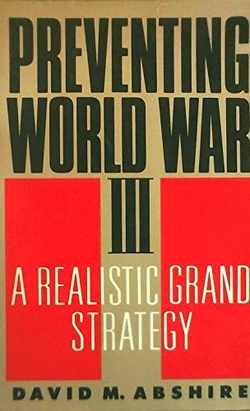 David Abshire, president of the Center for Strategic and International Studies in Washington, sets out to accomplish three things in Preventing World War III: to offer his reminiscences as U.S. ambassador to NATO, to discuss some perennial NATO issues, and to plead that the U.S. government adopt a grand strategic outlook. Unfortunately, he succeeds well at only one of them. But, fortunately, that one is by far the most important of the tasks he takes up.
David Abshire, president of the Center for Strategic and International Studies in Washington, sets out to accomplish three things in Preventing World War III: to offer his reminiscences as U.S. ambassador to NATO, to discuss some perennial NATO issues, and to plead that the U.S. government adopt a grand strategic outlook. Unfortunately, he succeeds well at only one of them. But, fortunately, that one is by far the most important of the tasks he takes up.
The first two, lesser efforts, do not get far. Abshire's personal reminiscences are of only minor interest; his review of NATO issues is routine. He argues that "the cockpit for World War III is in Europe."
Although a self-professed "cheerleader for NATO," he does recognize the dire need for reform of the organization. He considers nuclear weapons less of a worry than tanks, guns and soldiers: "The conventional imbalance is at the heart of the problem ... If present trends continue, Soviet blitzkrieg forces in the 1990s will have a new potential to intimidate Western Europe."
One can disagree with some of Abshire's views. His extreme Eurocentrism, for example, turns resolution of the Arab-Israeli conflict into a way to heal rifts within NATO! Dwelling too much on technicalities, he sometimes misses the central issue, as when he worries that errors in judgment are more likely to cause a Soviet-United States war than the Kremlin's clumsy aggressiveness.
In the end, the substance of Abshire's recommendations is less a problem than the fact that there is little new here. Preventing World War III covers ground that has been competently tilled countless times before.
The other problem is that Abshire indulges himself in that unhappy new literary genre, the Washington memoir/polemic. The melding of personal experience with a statement of high principles has become commonplace, but it rarely works. In this case, readers who want the inside dope on NATO headquarters in Brussels have to skip over Abshire's speculations.
And anyone seeking a sustained argument about NATO must navigate past personal anecdotes that are superfluous and, at times, egocentric. To make matters worse, Abshire's persona is wooden when he adopts the first-person voice.
The part of Preventing World War III that works very well is Abshire's presentation of his ideas about grand strategy, which is defined as the way a state deploys the totality of its resources.
First, Abshire presents a draft of such a strategy. Though the specific proposals contain few surprises, being small in scope and bureaucratic in nature, they have the merit of being thoughtful and practical.
The author would have Washington increase the role of deterrence by paying more attention to conventional forces. He calls for greater coordination with allies on such matters as negotiations with the Soviet Union, competition for scarce resources, trade policy and exploitation of technology.
Finally, he proposes the creation of a new White House position, a Cabinet-level counselor to the president "responsible for overall strategy," one individual who would coordinate security and economic planning.
Second, Abshire makes a compelling case for the American need for a conception of the whole, a "long-range, integrated strategy." Such an appeal is no new effort for the author, who for years has hammered away at the point that Washington needs to look at the entirety of its relationship with allies and antagonists.
Thus, work he began with the sponsorship of programs at CSIS and continued in a variety of government positions (including special counselor to President Reagan in the aftermath of the Iran-contra affair), he now continues in book form.
There is the real value of Preventing World War III – not so much in the specifics of a strategy as in the repeated call for a different (and a more classically European) way of thinking. Abshire's untiring campaign to get Americans to look at the world with deeper thought and from a broader perspective will probably be his lasting contribution.
The reviewer is director of the Foreign Policy Research Institute in Philadelphia and editor of Orbis, its quarterly journal. His most recent book is The Long Shadow: Culture and Politics in the Middle East.